Unit 2 Space Invaders综合教程四
- 格式:ppt
- 大小:4.87 MB
- 文档页数:12
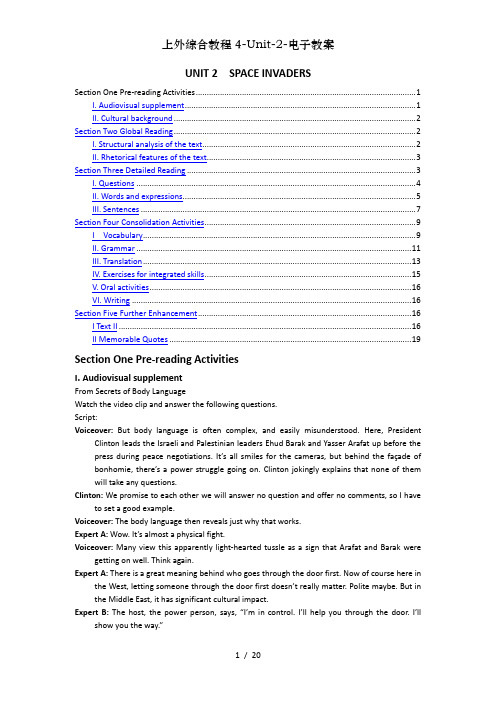
UNIT 2 SPACE INVADERSSection One Pre-reading Activities (1)I. Audiovisual supplement (1)II. Cultural background (2)Section Two Global Reading (2)I. Structural analysis of the text (2)II. Rhetorical features of the text (3)Section Three Detailed Reading (3)I. Questions (4)II. Words and expressions (5)III. Sentences (7)Section Four Consolidation Activities (9)I Vocabulary (9)II. Grammar (11)III. Translation (13)IV. Exercises for integrated skills (15)V. Oral activities (16)VI. Writing (16)Section Five Further Enhancement (16)I Text II (16)II Memorable Quotes (19)Section One Pre-reading ActivitiesI. Audiovisual supplementFrom Secrets of Body LanguageWatch the video clip and answer the following questions.Script:Voiceover:But body language is often complex, and easily misunderstood. Here, President Clinton leads the Israeli and Palestinian leaders Ehud Barak and Yasser Arafat up before the press during peace negotiations. It’s all smiles for the cameras, but behind the façade o f bonhomie, there’s a power struggle going on. Clinton jokingly explains that none of them will take any questions.Clinton: We promise to each other we will answer no question and offer no comments, so I have to set a good example.Voiceover: The body language then reveals just why that works.Expert A:Wow. It’s almost a physical fight.Voiceover: Many view this apparently light-hearted tussle as a sign that Arafat and Barak were getting on well. Think again.Expert A: There is a great meaning behind who goes through the door first. Now of course here in the West, letting someone through the door first doesn’t really matter. Polite maybe. But in the Middle East, it has significant cultural impact.Expert B:The host, the power person, says, “I’m in control. I’ll help you through the door. I’ll show you the way.”Arafat:Thank you. Thank you.Voiceover: Throw in the fear and tension present in most Middle East negotiations, and suddenly, the desire of both Arafat and Barak not to go through that door before the other starts to make sense.Expert C: This is a classic example in its extreme way of how the last man through the door is the winner. So Barak reaches for Yasser Arafat. Arafat literally grasps his arm, moves on, and starts wagering his finger at Barak, who, then, Barak, uses this opportunity as a wrestling match to move around, to actually be behind Arafat, and then literally grasps Arafat, holds him by the arm, and shoves him through the door.Expert B:So you’ve got fear and power struggle, s howing in big big big big bold body language with it.Questions:1. How is the “getting through the door” movement understood by many people?Answer: Many view this apparently light-hearted tussle as a sign that Arafat and Barak were getting on well.2. What is the hidden message behind the scene?Answer: Arafat and Barak are struggling to get through the door after the other party in order to show “I am in control”.3. What does this story tell us?Answer: Body language is very important, but often complex and easily misunderstood.II. Cultural backgroundPersonal spacePersonal space can be imagined as a kind of bubble surrounding a person that protects his or her privacy and which other people may not normally enter. Allowing somebody to get very close and enter your personal space may be a sign of trust or love. On the other hand, intruding other’s personal space can be rather offensive.The amount of space people need to feel around them varies with various factors, such as culture, sex, familiarity between people, crowdedness of the situation, etc. For example:●people from cultures that like a lot of personal space feel awkward and embarrassed when somebody comes too close to them;●people of the same sex may sit or stand closer to each other than to somebody of the opposite sex;●strangers and casual acquaintances usually need more space than friends and members of the same family who know each other well;●in a noisy street people may need to stand closer than they would normally, simply in order to hear each other.Section Two Global ReadingI. Structural analysis of the textIn the text, the writer first points out the fact that nowadays people are more concerned about themselves and want to have a larger personal space than decades ago, and then he analyses the causes of space invasion.The text can be divided into three parts.Part I (Paragraphs 1 – 2): T he writer calls the reader’s attention to the invasion of personal spaceby relating an experience of how his personal space was invaded.Part II (Paragraphs 3 – 7): The writer analyzes some likely causes of the shrinkage of personal space, and attributes the invasion of personal space to the general decline of good manners. Part III (Paragraph 8 – 9): The author presents his view about the essence of personal space, i.e. it is psychological, rather than physical, and urges people to “expand the contracting boundaries of personal space”.II. Rhetorical features of the textA vivid and accurate description of the behaviour of the space invaders and those whose personal space is being invaded is achieved by a delicate selection of verbs. Some of the examples are as follows.Verbs and verbal phrases used to describe the behaviour of space invaders:- a man … started inching toward me … (Paragraph 1)- In elevators, people are wedging themselves in just before the doors close ... (Paragraph 3)- In movie theatres these days, people are staking a claim to both armrests, annexing all the elbow room ... (Paragraph 7)Verbs and verbal phrases used to describe the reaction of those whose space is being invaded:- I minutely advanced toward the woman… in front of me ... (Paragraph 1)- … who absent-mindedly shuffled toward the white-haired lady ahead of him ... (Paragraph 1) Practice:Please find more examples to illustrate the author’s careful choice of verbs.Section Three Detailed ReadingSPACE INVADERSRichard Stengel1 At my bank the other day, I was standing in a line snaking around some tired velvet ropeswhen a man in a sweat-suit started inching toward me in his eagerness to deposit his Social Security check. As he did so, I minutely advanced toward the woman reading the Wall Street Journal in front of me, who, in mild annoyance, began to sidle up to the man scribbling a check in front of her, who absent-mindedly shuffled toward the white-haired lady ahead of him, until we were all hugger-mugger against each other, the original lazy line having collapsed in on itself like a Slinky.2 I estimate that my personal space extends eighteen inches in front of my face, one foot toeach side, and about ten inches in back — though it is nearly impossible to measure exactly how far behind you someone is standing. The phrase “personal space” has a quaint, seventies ring to it (“You’re invading my space, man”), but it is one of those gratifying expressions that are intuitively understood by all human beings. Like the twelve-mile limit around our national shores, personal space is our individual border beyond which no stranger can penetrate without making us uneasy.3 Lately, I’ve found that my personal space is being invaded more than ever before. Inelevators, people are wedging themselves in just before the doors close; on the street, pedestrians are zigzagging through the human traffic, jostling others, refusing to give way; on the subway, riders are no longer taking pains to carve out little zones of space between themselves and fellow-passengers; in lines at airports, people are pressing forward like fidgety taxis at red lights.4 At first, I attributed this tendency to the “population explosion” and the relentlessMalthusian logic that if twice as many people inhabit the planet now as did twenty years ago, each of us has half as much space. Recently, I’ve wondered if it’s the season: T-shirt weather can make proximity more alluring (or much, much less). Or perhaps the proliferation of coffee bars in Manhattan — the number seems to double every three months — is infusing so much caffeine into the already jangling locals that people can no longer keep to themselves.5 Personal space is mostly a public matter; we allow all kinds of invasions of personal spacein private. (Humanity wouldn’t exist without them.) The logistics of it vary according to geography. People who live in Calcutta have less personal space than folks in Colorado. “Don’t tread on me” could have been coined only by someone with a spread. I would wager that people in the Northern Hemisphere have roomier conceptions of personal space than those in the Southern. To an Englishman, a handshake can seem like trespassing, whereas to a Brazilian, anything less than a hug may come across as chilliness.6 Like drivers who plow into your parked and empty car and don’t leave a note, people nolonger mutter “Excuse me” when they bump into you. The decline of manners has been widely lamented. Manners, it seems to me, are about giving people space, not stepping on toes, granting people their private domain.7 I’ve also noticed an increase in the ran ks of what I think of as space invaders,mini-territorial expansionists who seize public space with a sense of manifest destiny. In movie theatres these days, people are staking a claim to both armrests, annexing all the elbow room, while at coffee shops and on the Long Island Railroad, individuals routinely commandeer booths and sets of facing seats meant for foursomes.8 Ultimately, personal space is psychological, not physical: it has less to do with the spaceoutside us than with our inner space. I suspect that the shrinking of personal space is directly proportional to the expansion of self-absorption: people whose attention is inward do not bother to look outward. Even the focus of science these days is micro, not macro. The Human Genome Project is mapping the universe of the genetic code, while neuroscientists are using souped-up M.R.I. machines to chart the flight of neurons in our brains.9 In the same way that the breeze from a butterfly’s wings in Japan may eventually producea tidal wave in California, I have decided to expand the contracting boundaries of personalspace. In the line at my bank, I now refuse to move closer than three feet to the person in front of me, even if it means that the fellow behind me starts breathing down my neck.I. Questions1. Is “personal space” a term of the seventies? Is it out of date nowadays? Why or why not? (Paragraph 2)Answer: “Personal space” was a term popularly used in the seventies but seldom mentioned nowadays. However, it doesn’t mean that it is out of date. People, whatever periods they are in, need personal space, which is not to be penetrated. The only problem is that the world is becoming so crowded that it is impossible for people to protect their personal space as well as they used to do.2. What does the author mean by saying “personal space is mostly a public matter”? (Paragraph 5)Answer: Personal space, first of all, is the space you expect and are expected to keep between you and other people in public places in order to maintain an appropriate interpersonalrelationship. Edward T. Hall in The Hidden Dimension, for example, describes the social values applied by Americans to certain distances between people as falling into four main categories: “Intimate distance (0 –1&1/2 feet), Personal distance (1&1/2 –4 feet), Social/Consultative distance (4 – 10 feet), and Public distance (10 or more feet).”3. Do you agree with the writer’s view that the contraction of the outer, personal space is proportional to the expansion of the inner-space of modern man? (Paragraph 8)Answer: Yes, people in the present society tend to be more self-centered, concentrating on their private affairs and ignoring the outer world around them. They say they have no time or energy to care about others in a society of fast tempo. As a matter of fact, they do not want to bother about it.Class ActivityGroup discussions:Topic A: Is personal space important to you? Why or why not?Topic B: According to your observation, does personal space vary in different places /relations / cultures? Give examples.II. Words and expressionsPart 1: Paragraphs 1-2snake: v. move in a twisting waye.g. The train was snaking its way through the mountains.Synonym: meanderinch: v. move very slow and carefullye.g.Howard inched forward in the crowd.He inched his way through the narrow passage.in mild annoyance: with a little anger or impatiencemild: a. not very great in degreee.g. We looked at each other in mild astonishment.Synonym: slightsidle: v. walk in a timid manner, esp. sideways or obliquelye.g. A man sidled up to me and asked if I wanted a ticket for the match.scribble:v. write or draw (sth.) carelessly or hurriedlySynonym: scrawle.g.He scribbled a note to his sister before leaving.She scribbled down her phone number and pushed it into his hand.Throughout the interview, the journalists scribbled away furiously.n. [U, sing.]careless and untidy writinge.g. How do you expect me to read this scribble?shuffle: v.walk by dragging one’s feet along or without lifting them fully from the grounde.g.He slipped on his shoes and shuffled out of the room.A fat woman was shuffling along with a pushchair.Collocations:shuffle sth. off: avoid talking or thinking about sth. because it is not considered importante.g.He shuffled the question off and changed the topic.shuffle out of sth.: try to avoid some unpleasant task by acting dishonestlye.g.I mistrust the way in which they shuffle out of sustained efforts.Slinky:n. A Slinky (“机灵鬼”,一种用软弹簧做成的会翻跟头的玩具) is a coil-shaped spring invented by mechanical engineer Richard James in Philadelphia, Pennsylvania. Slinkys come in various sizes and shapes. They can “walk” down stairs as the coils stretch and reform as gravity moves them down each step, the spring’s momentum causing it to spill end over end from one step to the next.ring: n. a quality, or an impression of having the quality that is mentionede.g. Her story had a ring of truth about it.The books he mentioned had a familiar ring about them.gratifying: a. giving pleasure or satisfactione.g. The new plan may be gratifying to the President.Derivations: gratify v.; gratification n.penetrate: v. succeed in forcing a way through (sth.)e.g. They penetrated into the territory where no man had ever gone before.The sun’s radiation penetrates the skin.Part II: Paragraphs 3-7wedge: v. force into a narrow space; fix sth. in position by using a wedge or sth. elsee.g. The people sitting close to me wedged me into the corner.Open the door wide and wedge it with a pad of newspaper.zigzag:v. move forward by going at an angle first to one side, then to the othere.g. We zigzagged up the hill.The narrow path zigzags up the cliff.n. a line or pattern that looks like a series of let ter W’s as it bends to the left and then to the right againe.g.The path descended the hill in zigzags.a. [only before noun]e.g. a zigzag line/path/patterncarve out: establish or create sth. through painstaking efforte.g. With months of strenuous work, the artist carved out a flower of ivory.Years of failures and setbacks have taught him and carved out a career for him.press: v.push, move, or make (one’s way) strongly, esp. in a crowde.g. He pressed his way through the crowd.So many peo ple pressed round the famous actress that she couldn’t get to her car. Translation:人群挤在她身边,争着要她的签名。
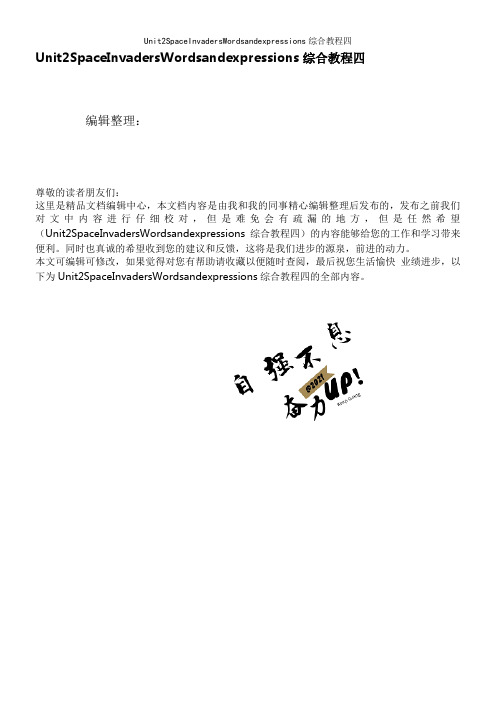
Unit2SpaceInvadersWordsandexpressions综合教程四编辑整理:尊敬的读者朋友们:这里是精品文档编辑中心,本文档内容是由我和我的同事精心编辑整理后发布的,发布之前我们对文中内容进行仔细校对,但是难免会有疏漏的地方,但是任然希望(Unit2SpaceInvadersWordsandexpressions综合教程四)的内容能够给您的工作和学习带来便利。
同时也真诚的希望收到您的建议和反馈,这将是我们进步的源泉,前进的动力。
本文可编辑可修改,如果觉得对您有帮助请收藏以便随时查阅,最后祝您生活愉快业绩进步,以下为Unit2SpaceInvadersWordsandexpressions综合教程四的全部内容。
UNIT 2 SPACE INVADERSWords and expressionssnake: v。
move in a twisting waye。
g. The train was snaking its way through the mountains.Synonym: meanderinch: v. move very slow and carefullye。
g.Howard inched forward in the crowd。
He inched his way through the narrow passage.in mild annoyance: with a little anger or impatiencemild: a. not very great in degreee。
g. We looked at each other in mild astonishment。
Synonym: slightsidle:v. walk in a timid manner, esp。
sideways or obliquelye。
g。
A man sidled up to me and asked if I wanted a ticket for the match.scribble:v. write or draw (sth.) carelessly or hurriedlySynonym: scrawle.g。
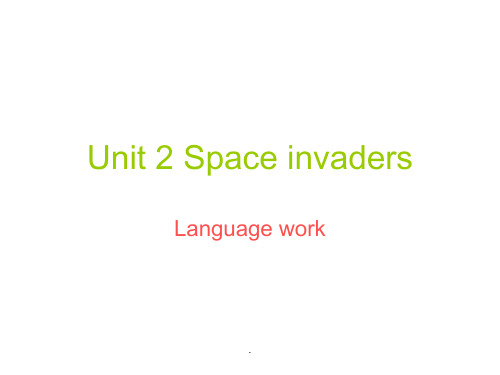
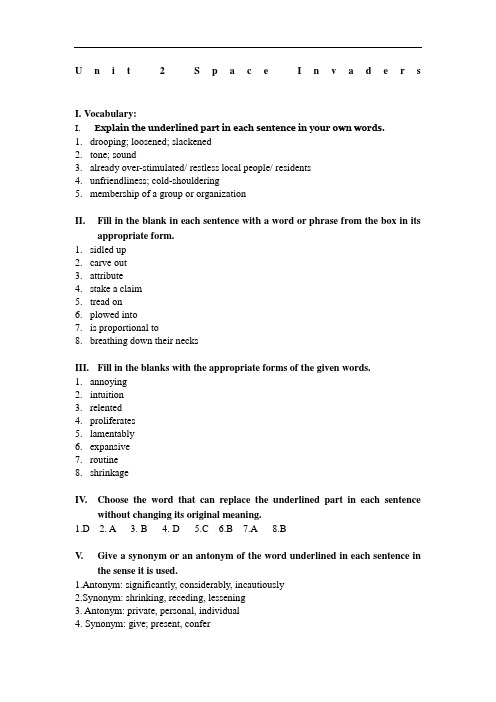
U n i t2S p a c e I n v a d e r sI.Vocabulary:I. Explain the underlined part in each sentence in your own words.1.drooping; loosened; slackened2.tone; sound3.already over-stimulated/ restless local people/ residents4.unfriendliness; cold-shouldering5.membership of a group or organizationII. Fill in the blank in each sentence with a word or phrase from the box in its appropriate form.1.sidled up2.carve out3.attribute4.stake a claim5.tread on6.plowed into7.is proportional to8.breathing down their necksIII. Fill in the blanks with the appropriate forms of the given words.1.annoying2.intuition3.relented4.proliferatesmentably6.expansive7.routine8.shrinkageIV. Choose the word that can replace the underlined part in each sentence without changing its original meaning.1.D2. A3. B4. D5.C6.B7.A8.BV. Give a synonym or an antonym of the word underlined in each sentence in the sense it is used.1.Antonym: significantly, considerably, incautiously2.Synonym: shrinking, receding, lessening3. Antonym: private, personal, individual4. Synonym: give; present, confer5. Antonym: tightened, tense, rigid6. Synonym: recently, currently7. Synonym: old-fashioned, odd, antiquated8. Synonym: uncomfortable, nervous, upsetVI. Explain the meaning of the underlined part in each sentence.1.promotion2.endure3.willingly4.canceled5.the most important thing6.moderately warmGrammarI.Fill in the blank in each sentence:1. C2. B3. B4. A5. D6. B7. D8. BII. Correct mistakes:1.Can he be given the job permanently?2.It can’t be t rue. There must be some mistake.3.Correct4.Gold cannot be dissolved in hydrochloric acid.5.Correct6.Mary could have gone off with some friends.7.It’s not fair. Joe can stay up till ten and I have to go to bed at nine.8.Although Sue had a bad accident last year, she was able to take part in the hurdleraces.9.I don’t agree with you, but there may be some sense in what you say.10.Despite yesterday’s snowfalls; we were able to drive home in less than an hour. III. Rewrite the following sentences:1.He is in poor health. He could/ may/ might/ can fall ill at any time.2.John looks pale today. He may be ill.3.Even experts can make mistakes.4.John could swim when he was five.5.Visitors could take photos of the castle.6.Could/ Can/ Might/ May I borrow your phone?7.Nobody knows where he is. He could/ may/ might be in the library or in the lab.8.John may have read the book on WWII.9.I looked everywhere but I couldn’t find my dictionary.10.Ken’s car had been stolen, so he couldn’t have given her a ride.plete the sentences:1.so2.not/ so3.does4.so5.one6.so7.do8.didbine every two sentences into one:1.It is such a surprise that I can’t get over it.2.It was such horrible weather that we spent the whole day indoors.3.Poor Susan had such a bad headache that she couldn’t get to sleep.4.Jack was so ou t of breath that he couldn’t speak at first.5.The music was so loud that you could hear it from miles away.6.The shirts became so stiff that he couldn’t put them on.7.She made such a good meal that we all ate far too much.8.There was so much to do that nobody ever got bored.Translation exercisesI. Translate the following sentences into Chinese.1.在我看来,礼貌就是给别人空间,不冒犯别人,允许别人有隐私。
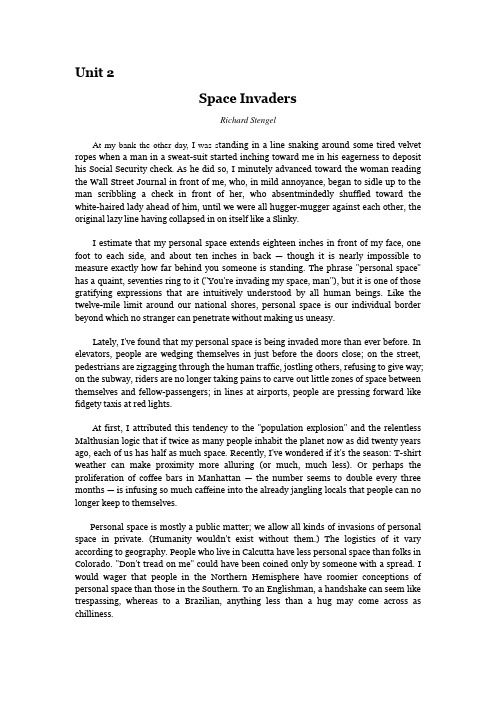
Unit 2Space InvadersRichard StengelAt my bank the other day, I was s tanding in a line snaking around some tired velvet ropes when a man in a sweat-suit started inching toward me in his eagerness to deposit his Social Security check. As he did so, I minutely advanced toward the woman reading the Wall Street Journal in front of me, who, in mild annoyance, began to sidle up to the man scribbling a check in front of her, who absentmindedly shuffled toward the white-haired lady ahead of him, until we were all hugger-mugger against each other, the original lazy line having collapsed in on itself like a Slinky.I estimate that my personal space extends eighteen inches in front of my face, one foot to each side, and about ten inches in back —though it is nearly impossible to measure exactly how far behind you someone is standing. The phrase "personal space" has a quaint, seventies ring to it ("You're invading my space, man"), but it is one of those gratifying expressions that are intuitively understood by all human beings. Like the twelve-mile limit around our national shores, personal space is our individual border beyond which no stranger can penetrate without making us uneasy.Lately, I've found that my personal space is being invaded more than ever before. In elevators, people are wedging themselves in just before the doors close; on the street, pedestrians are zigzagging through the human traffic, jostling others, refusing to give way; on the subway, riders are no longer taking pains to carve out little zones of space between themselves and fellow-passengers; in lines at airports, people are pressing forward like fidgety taxis at red lights.At first, I attributed this tendency to the "population explosion" and the relentless Malthusian logic that if twice as many people inhabit the planet now as did twenty years ago, each of us has half as much space. Recently, I've wondered if it's the season: T-shirt weather can make proximity more alluring (or much, much less). Or perhaps the proliferation of coffee bars in Manhattan —the number seems to double every three months — is infusing so much caffeine into the already jangling locals that people can no longer keep to themselves.Personal space is mostly a public matter; we allow all kinds of invasions of personal space in private. (Humanity wouldn't exist without them.) The logistics of it vary according to geography. People who live in Calcutta have less personal space than folks in Colorado. "Don't tread on me" could have been coined only by someone with a spread. I would wager that people in the Northern Hemisphere have roomier conceptions of personal space than those in the Southern. To an Englishman, a handshake can seem like trespassing, whereas to a Brazilian, anything less than a hug may come across as chilliness.Like drivers who plow into your parked and empty car and don't leave a note, people no longer mutter "Excuse me" when they bump into you. The decline of manners has been widely lamented. Manners, it seems to me, are about giving people space, not stepping on toes, granting people their private domain.I've also noticed an increase in the ranks of what I think of as space invaders, mini-territorial expansionists who seize public space with a sense of manifest destiny. In movie theatres these days, people are staking a claim to both armrests, annexing all the elbow room, while at coffee shops and on the Long Island Railroad, individuals routinely commandeer booths and sets of facing seats meant for foursomes.Ultimately, personal space is psychological, not physical: it has less to do with the space outside us than with our inner space. I suspect that the shrinking of personal space is directly proportional to the expansion of self-absorption: people whose attention is inward do not bother to look outward. Even the focus of science these days is micro, not macro. The Human Genome Project is mapping the universe of the genetic code, while neuroscientists are using souped-up M.R.I. machines to chart the flight of neurons in our brains.In the same way that the breeze from a butterfly's wings in Japan may eventually produce a tidal wave in California, I have decided to expand the contracting boundaries of personal space. In the line at my bank, I now refuse to move closer than three feet to the person in front of me, even if it means that the fellow behind me starts breathing down my neck空间入侵者理查德·斯坦格尔1 几天前,我去银行排队,队伍沿着松松垮垮的天鹅绒围栏蜿蜒前伸,这时一位身穿运动套装的男子急不可耐地从我后头向前挪步,想尽早办理社会保险支票存储业务。

UNIT 2 SPACE INVADERSLearning Objectives1)First listen to and then talk about personal space.2)Learn text I Space Invader.3)Wrote a letter to describe a crowdy situation.4)Listen to A typical English conversation.5)Read supplementary material Space and Distance.Warm-up Questions1)How do you feel if you are one of the passengers2)Is personal space important to you Why or why not3)What do you usually do when you are in a crowded bus or subway4)If people stand too close or too far to you, how do you feel And what would youdo5)Do we have a weaker sense of personal space than the Westerners Why or why not6)What elements affect people’s personal space senseCultural backgroundPersonal spacePersonal space can be imagined as a kind of bubble surrounding a person that protects his or her privacy and which other people may not normally enter. Allowing somebody to get very close and enter your personal space may be a sign of trust or love. On the other hand, intruding other’s personal space can be rather offensive.The amount of space people need to feel around them varies with various factors, such as culture, sex, familiarity between people, crowdedness of the situation, etc. For example:● people from cultures that like a lot of personal space feel awkward andembarrassed when somebody comes too close to them;● people of the same sex may sit or stand closer to each other than to somebody of the opposite sex;● strangers and casual acquaintances usually need more space than friends and members of the same family who know each other well;● in a noisy street people may need to stand closer than they would normally, simply in order to hear each other.Text ISPACE INVADERSRichard StengelGlobal ReadingI. Structural analysis of the textIn the text, the writer first points out the fact that nowadays people are more concerned about themselves and want to have a larger personal space than decades ago, and then he analyses the causes of space invasion.The text can be divided into three parts.Part I (Paragraphs 1 –2):T he writer calls the reader’s attention to the invasion of personal space by relating an experience of how his personal space was invaded. Part II (Paragraphs 3 –7):The writer analyzes some likely causes of the shrinkage of personal space, and attributes the invasion of personal space to the general decline of good manners.Part III (Paragraph 8 – 9): The author presents his view about the essence of personal space, . it is psychological, rather than physical, and urges people to “expand the contracting boundaries of personal space”.II. Rhetorical features of the textA vivid and accurate description of the behaviour of the space invaders and those whose personal space is being invaded is achieved by a delicate selection of verbs. Some of the examples are as follows.Verbs and verbal phrases used to describe the behaviour of space invaders:- a man … started inching toward me … (Paragraph 1)- In elevators, people are wedging themselves in just before the doors close ... (Paragraph 3)- In movie theatres these days, people are staking a claim to both armrests, annexing all the elbow room ... (Paragraph 7)Verbs and verbal phrases used to describe the reaction of those whose space is being invaded:- I minutely advanced toward the woman… in front of me ... (Paragraph 1)- … who absent-mindedly shuffled toward the white-haired lady ahead of him ... (Paragraph 1)Detailed ReadingQuestions1. Is “personal space” a term of the seventies Is it out of date nowadays Why or why not (Paragraph 2)Answer: “Personal space” was a term popularly used in the seventies but seldom mentioned nowadays. However, it doesn’t mean that it is out of date. People, whatever periods they are in, need personal space, which is not to be penetrated. The only problem is that the world is becoming so crowded that it is impossible for people to protect their personal space as well as they used to do.2. What does the author mean by saying “personal space is mostly a public matter”(Paragraph 5)Answer: Personal space, first of all, is the space you expect and are expected to keep between you and other people in public places in order to maintain an appropriate interpersonal relationship. Edward T. Hall in The Hidden Dimension, for example, describes the social values applied by Americans to certain distances between people as fall ing into four main categories: “Intimate distance (0 –1&1/2 feet), Personal distance (1&1/2 –4 feet), Social/Consultative distance (4 –10 feet), and Public distance (10 or more feet).”3. Do you agree with the writer’s view that the contraction of the outer, personal space is proportional to the expansion of the inner-space of modern man (Paragraph 8)Answer: Yes, people in the present society tend to be more self-centered, concentrating on their private affairs and ignoring the outer world around them. They say they have no time or energy to care about others in a society of fast tempo. As a matter of fact, they do not want to bother about it.Text IISPACE AND DISTANCE1Larry A. Samovar etLead-in QuestionsWhat are some of the ways in which space and distance are used to communicate Could you find any gender differences in the use of spaceMain IdeaNotes1. About the text ― This text is taken from Communication between Cultures (ThirdEdition) written by Larry A. Samovar, Richard E. Porter and Lisa A. Stefani and published by Wadsworth in 1998.2. About the author ― Larry A. Samovar is a teacher of San Diego State University.3. proximics (Paragraph 1) ― the study of space and di stance between people4. stand one’s ground(Paragraph 2) ― stick to one’s position or opinion5. collective cultures (Paragraph 2) ― cultures that emphasize collectivism6. Condon (Paragraph 2) ― Condon, and also Ruch, Hall and Hall, and Leathers,appearing in later paragraphs, are names of authors listed in the bibliography of the book from which the text is excerpted. Presumably these people have also made contributions to the area of intercultural communication. Most probably one of the Halls in “Hall and Hall” refers to the famous 20th-century American anthropologist Edward T. Hall, whose book The Hidden Dimension(1966)is a study of “social and personal space and man’s perception of it.”7. function (Paragraph 5) ― party; reception8. arranged hierarchically (Paragraph 7) ― arranged according to one’s rank orimportance9. co-cultures(Paragraph 8) ― In cell biology, co-culture means the growth ofdistinct cell types in a combined culture. Here it refers to the cultures that have derived from the combination of different cultures.10. at a premium(Paragraph 8) ― very difficult to get because it is so little inamountAdditional notes1. Culture influences the manner and meaning in seating arrangements. (Paragraph4) —Culture influences the way seats are arranged and the meaning sucharrangements convey.2. The Chinese often experience alienation and uneasiness … (Paragraph 4) — TheChinese often feel isolated and anxious …3. Prostitutes, for example, are very possessive of their territory. (Paragraph8) — Prostitutes, for example, have a strong sense of possession about theirown particular territory, . they do not want other prostitutes to trespass on their area of “business.”Questions for discussion1. Do you keep the same distance from other people, when interacting with them2. Where do you usually sit in a meeting room if you can make your choice Try to explain why you have such a preference.3. Suppose a friend comes to see you when you are watching an interesting TV play in your sitting room. Will you turn off the TV before you start your conversationKey to Questions for discussion1. No. The distance we keep from other people depends on our interpersonalrelationship. We tend to keep longer distances from strangers and shorter from close friends and family members. (In answering this question, you can be more specific through exemplification.)2. Tell your classmates whether you prefer to sit in the front, in the middle, orat the back of the meeting room. There can be different reasons for different people to make the same choice. For example, if you prefer to sit in the front, you might want to hear the speakers more clearly, or to catch the attention of the chairman or the speakers. But of course there are other reasons, non-physical ones, that determine your choice.3. In most cases we will turn off the TV before the conversation starts. Any delaywill mean that the visitor comes at a wrong time and therefore he or she is notwelcome, at least at this moment.Memorable QuotesLet there be space in your togetherness.—Kahlil GibranCivilization is the progress toward a society of privacy. The savage’s whole existence is public, ruled by the laws of his tribe. Civilization is the process of setting man free from man.—Ayn RandKahlil Gibran(1883 –1931) was a Lebanese-American philosophical essayist, novelist, mystical poet, and artist. In the 1960s, Gibran’s works influenced especially American popular culture. His most famous book is The Prophet (1923). Ayn Rand (1905 – 1982) was a Russian-American novelist, philosopher, playwright, and screenwriter. She was known for her two best-selling novels and for developing a philosophical system she called Objectivism.Questions for discussion:1. Some people say “Distance breeds beauty”. How do you understand this in terms of “personal space”2. Do you agree that the enhancement of people’s sense of privacy is a representation of the progress of civilization Explain and give examples.Guidance:1. Suggestion: what is “personal space”; “personal space” exists in all cultures and in all relationships; inappropriate violation of “personal space” evokes offence; “Let there be space in your togetherness”.2. Suggestion: a comparison of the barbaric tribal life and the modern civilized life。